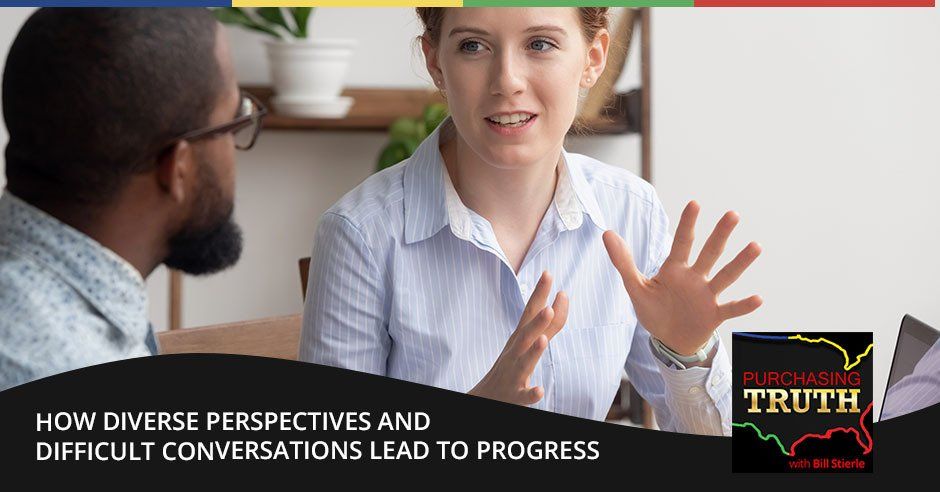How Diverse Perspectives And Difficult Conversations Lead To Progress
Subscribe Today!
You can’t smooth one surface without creating friction from another, and you can’t create harmony by singing only one note. The same goes for people having conflicting opinions. On today’s show, Bill Stierle and Tom discuss how having difficult conversations is the only way to create progress in a path to the truth. They tackle why difficult conversations are getting harder to have and what role social media has played in this dynamic. There is beauty and integrity in a diversity of perspectives, and it is important we embrace and utilize that to progress as a nation.
---
Watch the episode here
Bill, it's time to have a conversation about having difficult conversations. We’ve come out of the 4th of July holiday weekend. A lot of people gathered together. I'm sure a lot of people had different views and opinions. It seems that this is something Americans need to learn how to do. Don't you agree? Otherwise, we're going to get further divided.
That's correct. It's a further divided America. Also, in the workplace, if you're not being able to have difficult conversations with your coworker, or your boss doesn't tell you the truth about stuff, or they start hiding things, they don't tell some people some things and other people other things, and somebody is left out of the loop, these days, the person can go, "I don't think I want to work for this company anymore because they don't have integrity. They're not taking the lead. They're not being honest with me. They've got a serious character flaw." They can even go in that direction.
It is difficult being able to speak up and express ourselves. Social media has amplified this, regrettably. You get to say something and there is limited accountability for saying stuff. Because of that wide audience of people that you're expressing yourself to, you'll find people that support you in that thing you might not want to let out of the bag. All of a sudden they've got, “How many people like what I said?” We are searching and competing for those likes, hearts and moments of affirmation because whether it's the cellphone being a portable slot machine that we're getting a dopamine hit from, our opinions can do the same thing. Social media allows us to express ourselves. It gives an uncontested point of view without or with limited accountability. That is a little bit of that crux of what we're getting worse at having difficult conversations.
Worse at it because a lot of people are avoiding it. Social media helps us avoid it because if I'm tired of seeing their opinion being amplified in front of me over and over again and I don't agree with that person, I can snooze that person for 30 days and not hear from them. If it gets so bad like in the case of a relative, regrettably, I’m like, "I don't want to see any of his posts anymore." I'm not going to unfriend him because he's my relative. I don't want him to see that I've unfriended him but I've had enough of seeing his messages. I can set Facebook to not see any of his posts. Now I'm not having that difficult conversation with someone but I'm having a more pleasant experience when I'm on my social media platform. I'm seeing fewer of those messages I disagree with. That's probably not very helpful, long-term.
As a country that is working on becoming a more perfect union, the idea is to be working on that. We've got to get a relationship between the foot on the gas and the foot on the brake. The foot on the gas is getting progress, growth and capitalism. The foot on the brake is getting safety, whole values straight, be honest with each other, have family values, and be able to have a stable life. It's the balance between those two. You can't crank down on one and the other. In order to do that, you've got to have a difficult conversation. Shall I spend or shall I save? That's a difficult conversation. Within one sentence, I've encapsulated it.
New ParagrShall I set a goal? When I don't reach the goal, how are other people supposed to approach that? Are they supposed to approach it as catastrophic that I didn't meet you reach my goal, or are they going to have a difficult conversation? What are some of the things that are in the way of that goal? How could have that goal taken place? Was that goal a good goal or not? How does that goal that you proposed affect the people that don't want to meet that goal with you? Look at how your body wanted the reaction and go like, "That's a difficult conversation." This group of people does not want to meet that goal. There's nothing we can say or do to make that person meet that goal because it's against whatever that belief is that they're setting with. Whether it's right or wrong, good or bad, they happen to be American and have a belief. They get to have a choice and freedom to execute that even if it's at the expense of others.
Bill, let's put the Coronavirus vaccine front and center with what you said. It is a difficult conversation. I have a very good friend who is a doctor and he is completely anti-vaccine. This doctor also treats me and my family but my family is not anti-vaccine. We sometimes have those difficult conversations. It's not a complete stranger. We know each other so maybe it's not as difficult to have that difficult conversation. I look at the numbers and I'm seeing 98% of new Coronavirus cases are from people that are not vaccinated. This is in the United States. For people that have the vaccine, while there are some breakthrough infections, it's not 100%. By and large, if you have the vaccine, you don't have to worry about Coronavirus anymore.
You don't have to worry about dying from Coronavirus. That is a small little adjustment because you can still get the virus but it will not have a catastrophic experience or hospital experience. It reduced the extreme of it. It doesn't mean it gave you such a boost that you repelled it. We are seeing some of those numbers that there is a repelling going on. Otherwise, we wouldn't have the numbers drop so quickly. It's valuable to go like, "How many people have died in an area?" versus, "They're coming to the hospital and it's not all that bad." That's a significant change and stuff. Your doctor who's anti-vax is latched on and is leaning onto certain experiences, beliefs and hypotheses that he has formulated because he's a scientist. That's what doctors are. They are meant to follow the rules and procedures. With that said, they're also looking for the wellness of their patients and trying to figure out how to get them better. If they see pieces of information that come across their desk, they become open to that new piece of information.
Here's the problem. What happens if I'm a patient and I come in and say, "Doctor, I have a stomachache. I saw this medicine on a commercial. Is this medicine good for me or not?" Who is bringing the medicine to the doctor? The patient is. What is the patient bringing the medicine from? The TV. Who's putting the thing on the TV? The pharmaceutical company. The doctor has already won back from the piece of marketing and branding. Both you and I know there is a range that happens with marketing and branding. All you got to do is be 51% true and the buyer will buy. That's not great. All of a sudden, our information is being dripped with 1/3 truths, 1/2 truths, 3/4 truths, any percentage of truth in between.
With drugs on television, it's very scary to me when I see any commercial. If you watch any live television, which I try not to do. Especially television around the dinner hour, early evening. These things are covered with pharmaceutical advertisements. If you listen to all of the disclaimers they're saying. "It may cause this. It may cause that. Do not use if you are this. Do not use if you are that." I'm like, "The benefit of this drug better be good if I'm going to risk all of those things."
Somebody that has been having medium to major pain in that area or they think it's an issue, but it really is an issue, the person might say, "I woke up last night. I had a cramp in my calf. It was hard. Where's that anti-cramps stuff?” You're looking for the thing because you don't want to have that painful experience again, "I've taken this before I went to bed and I don't get cramps anymore." That's partially true but it's also partially going, "You change your diet a little bit that day and that stopped your cramping. You didn't work out the way you did, or you're better hydrated and didn't have cramps, or you have more potassium.” I could go down the list. There are other reasons but I created that belief. Having a difficult conversation allows us to have our point of view, and having curiosity and tolerance for another person's point of view at the start. Otherwise, you're doing social media and booting people off. You're kicking them out and going like, “I'm going to block that person. That person's wrong.” It's interesting to see how truth works.
What's happening in America, at least, is captured well by this quote. You have a little meme of a quote from George Orwell. Do you want to share that?
It says, "A further a society drifts from the truth, the more it will hate those who speak it," George Orwell. The famous book, Nineteen Eighty-Four, was all about what do you do with truth and how do you do truth and the way that one person would like truth to be done, exercises to be done this way, as well as other things. We're going to watch you through your TV, which is essentially the internet coming things or any 1 of 5 talking devices I have in my house that I can ask any question I want and I can get a form of truth. I notice my skepticism is sitting right there. I can get a form of truth by asking any of the devices. I'm a little scared to mention their names, they'll start talking at me because they're listening for a familiar word that I'm saying like, “What would you like me to research?” They're sitting waiting because I use the word research. We want to get a hold of a truth perspective, which is we start with the information we have and the wisdom, knowledge and experience up to this.
Tom, you and I both know within the short amount of time that there are 90 things on our cellphone that, as older guys, we don't know how to use, where our kids do. Therefore, they're holding a greater truth, efficiency and effectiveness in using the phone. We are not and that's the truth. We could get better skills at that but not without trying to get on the gerbil wheel and trying to run after our own personal and professional development or personal growth. We've got to remain curious and keep adjusting our perspective or otherwise, we're not able to have difficult conversations with people.
George Orwell's quote is right. The more society drifts from truth, the more we'll hate those who speak it. We're seeing this in social media and social media feeds into it. If you hate those who speak a certain truth, you can silence them and not hear them. That's the opposite of having a difficult conversation to try to gain perspective, understand each other, and try to move forward together as Americans in this country, in which we're all here. We have to live with each other. As much as some people might say, "If this person gets elected, I'm going to move to Canada." It is a choice but half of America isn't going to move to Canada every four years. Most of us are going to remain here.
In my business practice, mediation practice, training and facilitation of companies, and training and facilitation of government agencies, I run into this thing all the time. Which is, how are we able to open our mouth and have some space for maybe stepping in the poop a little bit and not going to be nailed for it? This is just an idea or a thought I'm having. Don't jump down my throat too early on this. You may want to think about what the 2nd or the 3rd thing is underneath that. The reason why freedom of speech is so important to us as a country and as human beings is you don't want people to shut up. As soon as they shut up, that entire conversation goes underground.
I want to know where the dangerous people are. The more open communication I get, the better off it is because the people that are going to do harm to others, I want to know where they are. I want social media to be open and expressive. The thing that's missing that I would like to prefer and see is curiosity and empathy for the people that are saying junky things. I'm guessing you're mad and you'd like fairness and health inside the community, equal protection under the law, and fairness in the court system. I want all that stuff above the board because since you don't get that, you get black market communication, which is the way a mob works. I'm going to make deals and create loyalty so you won't tell bad things about me and you won't go to court. It goes under if you can't go get it. The problem is we've got to watch and call out that narrative that is doing that because otherwise, it will not go as well.
It's interesting that we're doing this to ourselves. The whole point of freedom of speech in our constitution is freedom of speech without a repercussion from the government. It's the idea that you can speak out against your government without fear of being put in jail as a dissenter over whatever is happening. We don't have to worry about that freedom of speech in America or being jailed because of our beliefs or what we say about our government. We do have to worry about being silenced on social media and about how others are going to perceive us or we're tuning each other out. The big divide in America is each side we're tuning each other out, only wanting to hear things that reinforce our beliefs because that makes us feel good.
I feel appreciative of you bringing that truth forward. It's like freedom of speech is about speaking up against government leadership. You and I both have worked at jobs that are not in government. It's a private job. The owner might not like what we say and think, “We can't promote him because he said or did this thing.” That's problematic because what the owner doesn't know is if he doesn't allow a healthy discussion with both ideas and bad news, it’s like, “I've discovered something. I'm not going to say anything because if I say something, I'm not going to get promoted.” That's problematic.
It is problematic but it's also perfectly legal. There's nothing that says you get the freedom of speech in your job and you're protected from retribution or whatever. It doesn't work that way.
Good owners can manage skilled owners. The ones that I trained can manage a voice of dissent and opposition. They can accept what the person's saying and gently shift it to something that everybody can feel good about, being in a relationship, be able to accept that there are different points of view. This might be a good idea. The way you're expressing yourself is not as helpful as this other way of expressing yourself. I'm not trying to make people behave. I'm trying to get people to communicate to make sure that there’s greater collaboration and cooperation. There's healthy and difficult communication. Two things, healthy and difficult communications. You got to get the healthy part in front of it, which is the arguing about taxes. It's got to be healthy, “This is the good reason why it's this percent. This is a good reason why that's built this way and why we need to change it to that way.” That's a healthy debate over something that's valuable. It’s not, “I'm right, you're wrong, shut up.” That's not healthy for us. Regrettably, we still have that going on.
We have it going on a lot. Let's come back to the Coronavirus vaccine. We started with that being a difficult conversation. It is one of those difficult conversations people are having across America. I'm also seeing the media as not being helpful in fostering healthy conversations. For example, Joe Biden's administration put up the goal of having 70% of Americans who receive at least one dose of the Coronavirus vaccine by July 4th, 2021. That was a good goal especially after the early goal of getting 100 million Americans vaccinated was achieved so quickly. The administration is like, "Let's raise the bar. This is the road to recovery. This is how we're going to get past this thing. Let's set a high goal, 70% by July 4th, 2021."
Despite all the best efforts, they didn't make that goal. That's all that I was hearing and seeing in the media. I don't know about you but this is the message being amplified, "Joe Biden's administration misses their Coronavirus vaccine goal." You'd think, “That's amplified so much. They must have missed it by a mile. It must have been a lot.” To me, that’s the emphasis being put on in the media and they weren't saying it. It's like, "Are you guys burying the lead? How badly did they miss it?" Nobody was saying that. I had to dig and research. It turns out they missed it by 3%, 67%. How much longer is it going to take to get there? I was thinking, “Is it going to take months? Has it slowed down that much?” No, about 2 or 3 weeks and we'll have reached that 70% goal. Are you telling me the media is amplifying this message that Joe Biden's administration missed their Coronavirus vaccination goal, and we're going to be there in a couple of weeks and it was only by 3%?
I got to get a headline to get a click. The brain works that way, Tom. It responds better to negative messages than it does to positive messages. It's like, "We did it.” They’re like, “Great, I don't have to worry about it." No, it's better that they almost got it. We were just about there. The brain says, “You hit your goal. I don't have to get vaccinated. You got through your 70% goal.” People are satisfied when I finished something off but all of a sudden, we're also psychologically flat-footed. You know this too. When we finish a project at work, "Now we can rest a little bit." All of a sudden, three weeks later, "What the hell did I do over the last three weeks? I got so much done before when I had the goal and I hit this thing. Why can't I finish that little, small piece at the end of it that I didn't finish? It's been weeks, months. All I had to do was that little thing to finish it but I didn't.” Why? It’s because I was done and I got it up. It worked perfectly. It came to conclusion.
It wasn't done but my brain psychologically finished it and closed it off. As being so, there's no further action needed to do it. There's no pressure, adrenaline and working. The media amplification, whether it's on purpose or they're being accurate, they set a goal and they didn't do it. If it was on purpose, who's going to blame that? If you're trying to motivate a couple of other people to be a part like, "It's time for me to get vaccinated. Yes, it's time for me to get my second shot.” There are still more people trickling in and then we're going to get to our 70%. The thing is for all of us to have awareness and consciousness of our own psychology, we've got to watch how we talk to ourselves.
Obviously, people can be easily influenced to get in the silo, only listen to certain information and get stuck in that certain information, whether it's Alex Jones or Tucker Carlson. It's hard to tell the difference between the two of them because they're amplifying in the same way. Not that there's something wrong with them or their messages. The way they amplify is to engage, not to bring to a resolution of truth. They're not interested in that. It's not important like they're talking truth. They're talking in order to build loyalty and connection with their program. They're the keeper of real information and they're convinced of it. How are you convinced of it? I have doubts and skepticism about many things that I have in my consciousness. That allows me to adjust my perspective, maintain curiosity, provide support to people in conflict, and have a wonderful sales conversation with somebody.
I almost wonder if the Joe Biden administration would have made a mistake by setting a goal of 65% by July 4th, 2021 and beating it because the media wouldn't be talking about it so much. It almost makes more sense to have a goal you're not going to meet. If I were Jen Psaki in the press corps through the administration, I would probably say, "You're right. We missed it by 3% but had we achieved that goal, you guys wouldn't be talking about it. We did the right thing.” Can you imagine if she flipped it on them like that?
That is a funny flip. Talking about the feeling of disappointment next to the feeling of optimism would have also been helpful in our narrative. We do feel disappointed that we didn't hit 70% because we set a lofty goal for ourselves. Notice I'm making the turn with the word lofty. We did set the bar a bit high. At the same time, we feel optimistic and joyous that we are able to reach that.
Also, make such progress in a short period of time.
I'm going to be Jen Psaki, “I feel curious when we're going to hit the 80% mark.” All of a sudden, she set the new bar and a goal.
She set a vision and a goal.
She also created uncertainty. We see the dopamine. Human beings chase dopamine around like its candy. Our body would love to get dopamine and serotonin. They want to stay in that space. It's going to pursue our cellphone because it rings and buzzes. It's going to look at email, Facebook or LinkedIn for pieces of information to serve knowledge. It's going to look at videos and news clips because it wants to get the latest hit. It's got to have some kind of reward in the messaging to get us to come in. We got to be baited a bit. We become sloppy pretty quickly sitting on the TV.
The administration could learn something from the marketer-in-chief, former President Donald Trump. The media would probably latch on if Jen Psaki said, “I feel curious about when we're going to hit that percent.” “Is that your new goal? When are you going to achieve that goal? When is the president going to achieve that goal?” “We'll see what happens." That's what she needs to say.
All of a sudden, former President Donald Trump was excellent at putting the three major narratives together. Present a reward, create anticipation and create uncertainty about it. Those are sales and marketing narratives. They are not production narratives or policy narratives. They are not getting anything completed narratives. You don't get stuff done by just talking about those three things. That goes to the people that need to do those things. If you're building a building, then it's the construction people and all the ones that are putting up the new thing. The marketer-in-chief goes, "I can't wait until this building is done. It's going to be wonderful. It's going to have some great features to it. People are going to like this experience of being in this building. It's going to be the best building ever." The marketer-in-chief gets to stay in his lane.
The challenge is, how do we have the difficult conversation that's needed in government? Government is about a series of difficult conversations. Are we going to meet the needs of the few? Are we going to meet the needs of the many? Do we go after supporting a country by getting involved in their war? Are we going to stay back and let them solve their own conflict? Are we going to sell them weapons? Are we not going to sell them weapons? Those are difficult conversations and you got to be ready to stay in the fire in order to do it as well as being compassionate to the person who lost out on their point of view and then it goes better.
It'll be interesting to see where the administration goes next in their messaging. Do they stay more optimistic? Do they pump their foot on the brakes a little bit and say to themselves, "This is what the next marker is for COVID. This is the next thing?" Do they turn their attention away from COVID? Not fully but do they turn it away and say, "Full-out press on other forms of infrastructure. Full-out press on expanding the economy on XYZ?” The economy got to keep pace and start changing with the economy the way China's been changing. They've been taking leaps and bounds. The estimation several years ago is, "It'll take them X about to catch up." That was not a true thought several years ago. They're starting to take certain initiatives. Their deal-making skills are one-sided, but if they provided a little bit more collaboration and cooperation, things would be much better with some of the initiatives they took. There's more difficult communication that you and I are going to get ourselves into, Tom. That's for sure.
I'm sure there are and we need to not avoid it. That's the big message here. Avoiding it is going to prolong our issues. We need to step into it and have those difficult conversations. It's more a matter of learning how to have those difficult conversations. Bill, if anybody is wondering about it, you certainly know how to advise them how to do that.
If anyone needs support with moving through difficult communications, please reach out. We will provide support to get you through those conversations. That's for sure.
Bill, thanks so much. I appreciate it.
Thanks, everybody.
Important Links:
Love the show? Subscribe, rate, review, and share!









